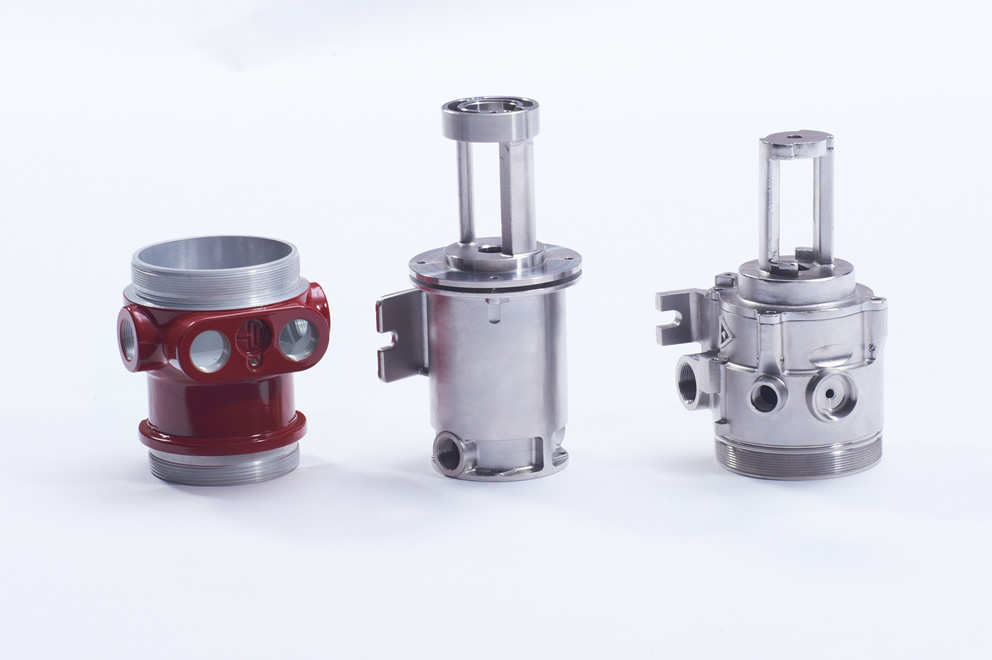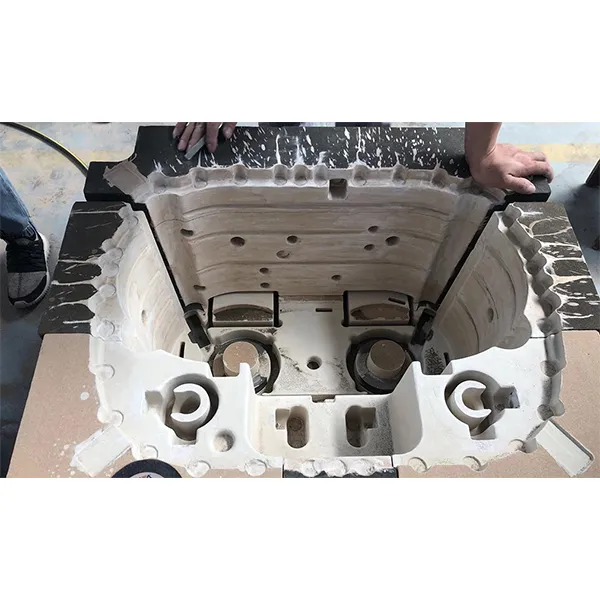How Light Weight Aluminum Foundries Contribute to Numerous Industries: A Comprehensive Introduction
Light weight aluminum shops work as essential vendors throughout multiple fields, consisting of automobile, aerospace, construction, and electronics. They generate parts that are not just light-weight but likewise resilient, enhancing the performance of various items. With sophisticated casting strategies and a commitment to sustainability, these factories are adjusting to fulfill evolving industry demands. As they introduce, the influence of aluminum spreadings on various applications raises crucial questions about the future of production. What lies ahead for this vital industry?
The Duty of Aluminum Foundries in the Automotive Industry
As the automobile market significantly embraces light-weight products to enhance gas effectiveness and efficiency, aluminum foundries play a crucial duty in this evolution. These facilities concentrate on the production of light weight aluminum spreadings, which are vital components in contemporary automobiles. By supplying high-strength, light-weight components, aluminum factories make it possible for makers to minimize the overall weight of vehicles, inevitably resulting in enhanced fuel economic situation and decreased discharges.
Aluminum's resistance to rust further improves car longevity, making it an appealing selection for car manufacturers. Shops use sophisticated strategies such as die spreading and sand spreading to develop precise and intricate components, making certain that they meet rigid industry criteria. Furthermore, the ability to reuse aluminum successfully adds to an extra sustainable manufacturing procedure. As the vehicle industry proceeds to innovate, light weight aluminum foundries will remain crucial in delivering the materials essential for the next generation of vehicles, supporting both efficiency and environmental objectives.

Aerospace Applications of Light Weight Aluminum Castings
Aluminum spreadings are important to the aerospace market, supplying a mix of lightweight strength and toughness that is vital for airplane efficiency. These spreadings are utilized in different parts, such as engine components, architectural structures, and touchdown gear, where weight decrease is important for fuel efficiency and total safety and security. The flexibility of aluminum enables for complicated geometries that boost aerodynamic efficiency while preserving structural honesty.
In addition, innovations in casting innovations have actually improved the precision and surface area coating of light weight aluminum parts, minimizing the requirement for extensive post-processing. This effectiveness not only speeds up manufacturing timelines yet likewise reduces prices, making aluminum an appealing choice for manufacturers. The rust resistance of light weight aluminum assurances longevity and reliability in harsh operating atmospheres, additionally establishing its role in aerospace applications. As the sector progresses, aluminum castings continue to be a vital material, driving development and supporting the advancement of next-generation airplane.
Building Industry Developments Through Light Weight Aluminum
The building sector has actually progressively embraced light weight aluminum due to its lightweight properties and versatility, paralleling its successful applications in aerospace. Advancements in light weight aluminum layout have caused more powerful, extra efficient structures, making it possible for building contractors and engineers to explore new possibilities. The material's resistance to corrosion and reduced upkeep needs make it specifically appealing for both commercial and property jobs.
Aluminum's versatility helps with the production of complex layouts, permitting aesthetic enhancements that were previously challenging with typical materials. Prefabrication techniques have additionally evolved, making use of aluminum to minimize building and construction time and expenses substantially. In addition, the power effectiveness of light weight aluminum systems-- such as window frameworks and roofing-- adds to sustainable building practices, aligning with contemporary ecological requirements. As the building sector remains to embrace these innovations, light weight aluminum's duty is anticipated to increase, driving further technology and adding to the growth of resistant facilities.
Electronic devices and the Need for Lightweight Aluminum Components
With the quick innovation of modern technology, the demand for light-weight light weight aluminum parts in the electronic devices sector has actually risen. As devices end up being extra portable and portable, makers look for products that supply both longevity and weight decrease. Aluminum, with its superb strength-to-weight ratio, has emerged as a recommended choice for components such as cases, warmth sinks, and architectural supports.
Making use of light weight aluminum not just enhances item performance yet likewise contributes to energy effectiveness, as lighter devices call for much less power throughout operation. Additionally, aluminum's superb conductivity makes it perfect for electronic applications, guaranteeing reliable warm dissipation and reducing the danger of overheating.
As consumer choices shift towards light-weight and sleek gizmos, aluminum shops play a vital duty in fulfilling the developing demands of the electronic devices industry (aluminum casting). Their capacity to create exact and premium aluminum components sustains technology, making it possible for producers to press the limits of style and performance
Lasting Practices in Aluminum Foundries
As the electronic devices sector progressively focuses on sustainability, light her comment is here weight aluminum shops are adapting their practices to straighten with these environmental goals. Lots of factories are executing recycling programs that reclaim light weight aluminum scrap, substantially minimizing the need for basic materials and decreasing waste. By using energy-efficient innovations, these centers are decreasing their carbon impact; as an example, utilizing electric furnaces rather than traditional gas-fired ones can bring about significant energy cost savings.
Furthermore, aluminum foundries are spending in water preservation steps, such as closed-loop systems that recycle water used in cooling down processes. These techniques not just reduced water consumption however also minimize the ecological impact connected with wastewater discharge. Lots of shops are discovering eco-friendly energy sources, such as solar and wind power, to fulfill their energy needs sustainably. Via these initiatives, aluminum foundries exemplify a dedication to ecological stewardship while continuing to fulfill the needs of the electronic devices industry.
Future Trends in Aluminum Foundry Technologies
Emerging innovations are positioned to change light weight aluminum shops, boosting effectiveness and item high quality while advancing sustainability initiatives. Advancements such as synthetic knowledge and artificial intelligence are anticipated to maximize manufacturing procedures by anticipating equipment failings and boosting source allocation. The combination of sophisticated robotics will simplify operations, lowering labor prices and decreasing human error.
Additive hop over to here manufacturing, or 3D printing, is additionally obtaining traction, making it possible for the manufacturing of intricate geometries that were previously unattainable with standard techniques. This shift could cause substantial material savings and lowered waste. In addition, smart factories using IoT (Internet of Things) technologies will make it possible for real-time monitoring and information analysis, promoting positive decision-making.
The fostering of cleaner melting technologies and recycling strategies will further reduce the ecological footprint of light weight aluminum factories, making them much more lasting. Collectively, these trends indicate a future where aluminum factories can operate with better efficiency and obligation.
Regularly Asked Inquiries
What Are the Environmental Influences of Light Weight Aluminum Foundries?

Exactly How Do Foundries Make Sure Quality Control in Aluminum Casting?
Foundries guarantee quality assurance in aluminum spreading by executing strenuous evaluation processes, making use of advanced technology, performing regular material testing, and adhering to sector requirements, thus keeping uniformity and dependability in their ended up items. aluminum casting.
What Is the Average Life-span of Light Weight Aluminum Cast Parts?
The typical life expectancy of aluminum cast parts typically varies from 10 to 50 years, depending upon factors such as environmental problems, usage, and maintenance. Proper care can considerably enhance their durability and performance over time.
Exactly How Are Light Weight Aluminum Alloys Selected for Details Applications?
Light weight aluminum alloys are picked based upon variables such as toughness, rust resistance, weight, and thermal conductivity. Engineers review the particular demands of applications to determine the most appropriate alloy for finest efficiency and resilience.
What Are the Safety And Security Rules for Aluminum Foundry Employees?
Security regulations for light weight aluminum shop workers include individual protective equipment requireds, air flow requirements, direct exposure limitations to hazardous products, and methods for managing molten metal. Compliance guarantees employee security and decreases health dangers related to factory operations.
As the auto sector increasingly welcomes light-weight materials to boost gas efficiency and efficiency, aluminum factories play a crucial moved here function in this advancement. As customer choices change in the direction of light-weight and smooth gadgets, aluminum factories play a necessary function in satisfying the evolving demands of the electronic devices industry. As the electronics market progressively prioritizes sustainability, aluminum shops are adjusting their practices to straighten with these environmental goals. Several shops are carrying out recycling programs that reclaim light weight aluminum scrap, substantially minimizing the demand for raw materials and decreasing waste. Security policies for light weight aluminum factory workers include individual safety equipment mandates, air flow needs, direct exposure limits to harmful materials, and methods for managing liquified steel.